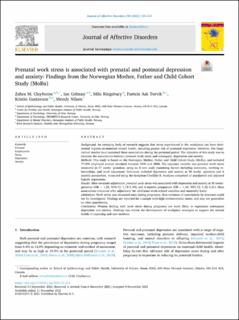| dc.contributor.author | Clayborne, Zahra M. | |
| dc.contributor.author | Colman, Ian | |
| dc.contributor.author | Kingsbury, Mila | |
| dc.contributor.author | Torvik, Fartein Ask | |
| dc.contributor.author | Gustavson, Kristin | |
| dc.contributor.author | Nilsen, Wendy | |
| dc.date.accessioned | 2022-08-01T06:31:21Z | |
| dc.date.available | 2022-08-01T06:31:21Z | |
| dc.date.created | 2021-12-02T10:41:33Z | |
| dc.date.issued | 2021 | |
| dc.identifier.citation | Journal of Affective Disorders. 2021, 298 548-554. | |
| dc.identifier.issn | 0165-0327 | |
| dc.identifier.uri | https://hdl.handle.net/11250/3009365 | |
| dc.description.abstract | Abstract Background: An emerging body of research suggests that stress experienced in the workplace can have detrimental impacts on maternal mental health, including greater risk of postnatal depression. However, few longitudinal studies have examined these associations during the perinatal period. The objective of this study was to examine the associations between prenatal work stress and subsequent depression and anxiety. Methods: This study is based on the Norwegian Mother, Father and Child Cohort Study (MoBa), and included 77,999 employed women recruited between 1999 and 2008. The exposure variable was prenatal work stress measured at 17 weeks' gestation, using an 8-item scale examining factors including autonomy, working relationships, and work enjoyment. Outcomes included depression and anxiety at 30 weeks' gestation and 6 months postpartum, measured using the Symptom Checklist-8. Analyses comprised of unadjusted and adjusted logistic regressions. Results: After covariate adjustment, prenatal work stress was associated with depression and anxiety at 30 weeks' gestation (OR = 1.33, 95% CI: 1.19-1.49), and 6 months postpartum (OR = 1.44, 95% CI: 1.28-1.61). Most associations remained after adjustment for additional work-related variables and maternity leave. Limitations: Work stress was measured once during pregnancy, thus variation of associations by trimester could not be investigated. Findings are reported for a sample with high socioeconomic status, and may not generalize to other populations. Conclusions: Women dealing with work stress during pregnancy are more likely to experience subsequent depression and anxiety. Findings can inform the development of workplace strategies to support the mental health of expecting and new mothers. Keywords: Anxiety; Depression; Employment; Prenatal; Stress. | |
| dc.language.iso | eng | |
| dc.title | Prenatal work stress is associated with prenatal and postnatal depression and anxiety: Findings from the Norwegian Mother, Father and Child Cohort Study (MoBa) | |
| dc.type | Peer reviewed | |
| dc.type | Journal article | |
| dc.description.version | publishedVersion | |
| dc.source.pagenumber | 548-554 | |
| dc.source.volume | 298 | |
| dc.source.journal | Journal of Affective Disorders | |
| dc.identifier.doi | 10.1016/j.jad.2021.11.024 | |
| dc.identifier.cristin | 1963204 | |
| dc.relation.project | Norges forskningsråd: 296770 | |
| dc.relation.project | Norges forskningsråd: 218373 | |
| dc.relation.project | Norges forskningsråd: 262700 | |
| cristin.ispublished | true | |
| cristin.fulltext | original | |
| cristin.qualitycode | 1 | |
